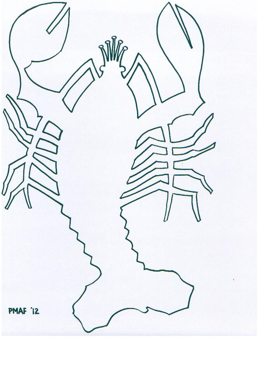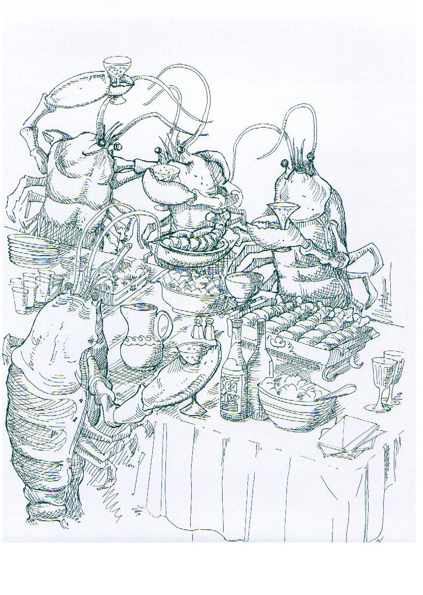
Tres poemas al vuelo
Ante la ausencia de los papeles, me inundó el remordimiento por el error cometido. En esos instantes cruzábamos un cúmulo de nubes. Se me puso la mente en blanco. Tuve la sensación de estar dentro de un conglador o en medio de un panal de luz.
¡Entonces ocurrió el poema!
Cristalizaron las primerras líneas: una visión de esa isla caribeña desde las alturas, al borde de la línea del horizonte, o bajo el tórrido sol de la playa. Ya en tierra, el esplendor de la naturaleza y el asedio de los colores confirmaron mi sospecha: el aire vibraba con una luminosidad especial. Esta suma de sensaciones y el nombre del congreso al que acudíamos, ¨Shifting the Geography of Reason¨, originaron el segundo poema.
La tercera composición surgió, más tarde, en un restaurante de lujo tropical. Entre palemras y helechos gigantes, flotando en acuarios burbujeantes, se exhibían los manjares acuáticos que los comensales debían elegir a su gusto. En la mesa, nuestras comañeras del congreso mostraron una magnética predilección por el platillo especial: langosta thermidor.
Esa noche, asistí al festín de unas reinas bronceadas engullendo a otras reinas marinas.
En fin, la dislocación de unos poemas olvidados en California, provocó la escritura de otros en el Caribe. ADS.
I
Aeropaisaje
Arriba
Espacios azules
que se extienden
en el papel del cielo
panales de luz
congelados en el tiempo
nubes de hielo
pájaros que vibran entre líneas de aire
ecos de plata
silbidos lejanos
cascabeles en el viento
Al fondo
Islas arboladas que arremeten
contra pupilas sorprendidas
verde tapiz tropical
montañas palpitantes
en un horizonte que flota
quieto
tranquilo
Abajo
Palmeras danzantes
faldas vegetales
vibrando entre las olas del viento
buganvilias de sonrisa morada
tabachines que se llaman flamboyants
y se pintan los labios de naranja
cocos bananas
papayas piñas
la pulpa decidida en su delicia
cactus que levantan las espinas
cristales encendidos hacia el cielo
arena blanca como talco
espejo ardiente que parpadea
ojo
silencioso y eterno
![]()
cíclope sol : cou coupé
cuello cortado
sangrante
sonrisa
celeste
II
Las arenas movedizas de la razón
El pensamiento respira
gotas de aire
las palabras sobran
la memoria rompe
contra las rocas del tiempo
la luz luminosa ciega
cicatrices del continente
fractura equinoccial
espacios dislocados
casas autos tabiques edificios
edificios tabiques autos casas
asfalto concreto
ideas abstractas
aquí
la naturaleza
devora
a la historia
III
El sueño de la langosta
Oh augusta langosta
exoesqueleto blando luego duro
de espinosas antenas palpitantes
soñando entre las aguas
madréporas erizos caracoles
arrecifes corales fruits de mer
Nocturna carroñera
fría interrogación abdomen cola
cómo ibas a saber que acabarías
reina de los menúes
enjoyada en acuarios luminosos
orquídea tropical
de los escaparates gargantúas
en vitrinas de lujo transparente
Burbujeante majestad marina
ensueño de gourmets
frente a este mar Caribe
–piel constelada de estrellas azules—
pienso en ti y en la ley inescrutable
del líquido calor tenaz y artero
en que hervirás boqueando
fosforescente y roja
cerrando con dolor
los ojos secos muertos para siempre
sin jamás comprender tu destino final
de galletas con crema thermidor
en maxilares altivos de jóvenes
bronceadas y estelares
delicia de las modas masculinas
sin que nada ni nadie
defienda tu armadura
ni te pueda amparar
Department of Modern Languages
Laney College, Chair
Tel. (510) 464 3199 / Fax (510) 464 3231
e-mail: agabriel1001@yahoo.com
translated by James Nolan
Three Poems in Flight
These poems have a particular story. When the plane carrying us to Guadeloupe began its descent, I remembered that I’d left behind the poems I’d written to read at the 2008 CPA Conference— pages that I’d strategically placed on my desk the night before so that I wouldn’t forget them!
Not bringing those papers flooded me with a sense of regret for the mistake I’d made. At that moment we sailed through a bank of cumulous clouds. My mind went blank. I felt as if I were inside of a freezer or in the middle of a honeycomb of light.
And that was when the poem came to me!
The first lines took shape: a vision of this Caribbean island from above, approaching the horizon, or under a sweltering sun on the beach. Once on land, the exuberance of nature and the onrush of colors confirmed my initial impression: the air zinged with a singular brightness. All of these feelings together with the name of the conference we were attending—“Shifting the Geography of Reason”—inspired the second poem.
The third idea came to me later in a fancy tropical restaurant. Between palms and enormous ferns, aquatic delicacies were bobbing in bubbling tanks from which diners could make their choices. At the table, our friends from the conference seemed irresistibly predisposed toward the house special: lobster Thermidor
That evening I participated in a feast of suntanned royalty wolfing down other sorts of queens from the briny deep.
So those misplaced poems forgotten back in California prodded me to write these poems in the Caribbean.
ISLANDS OFF THE MAP


I
The Flight
Above
Blue spaces
stretched out
across a paper sky
honeycombs of light
frozen in time
icy clouds
birds that quiver between corridors of air
silver echoes
distant whistles
rattles in the wind
Underneath
Tree-carpeted islands that rush up
to meet astonished eyes
green tropical tapestry
mountains that throb
along a floating horizon
still
peaceful
Down Here
Palm tree ballerinas
leafy tutus
twirling between tides of wind
the purple smile of bougainvillea
peacock flowers called flamboyants
put on tangerine lipstick
coconuts bananas
papayas pineapples
cacti that raise thorns
lit prisms of glass toward the sky
sand white as talcum powder
red-hot mirror that blinks
silent and eternal
eye
![]()
![]()
![]()
cyclops sun : cou coupé
cut throat
bleeding
heavenly
smile
II
THE SHIFTING SANDS OF REASON
Thinking takes a breather
gulps of air
too many words
memory crashes
against the boulders of time
the bright light blinds
a continent’s scars
equinox split apart
spaces off the map
houses cars brick walls buildings
buildings brick walls cars houses
specific pavement
heady notions
here
nature
gobbles up
the past


III
Lobster Daydream
Consider the noble lobster
soft exoskeleton hardening
prickly antennae twitching
snoozing among the waves
madrepores sea urchins whelks
reefs coral fruits de mer
Lowly midnight scavenger
a cold appraisal snout to stomach
how could you ever fathom
that you’d end up crowned
queen of the menus
bejeweled in spot-lit aquariums
hothouse orchid
of monstrous window displays
and glass cases of expensive light
Your Highness, I think of you
bubbling underwater
gourmet fantasy
of the Caribbean waterfront—
shell galaxied with blue stars—
and of the secret recipe
the persistent hiss of that cunning liquid hell
in which you’ll boil scarlet
phosphorescent and mouthing
painfully shutting
your seared dying eyes for good
with no clue as to your last stop
a creamy Thermidor with crackers
in the haughty jaws of suntanned starlets
delectable morsel for male models
with nobody or nothing
that can toughen your suit of armor
or save your sweet tail







